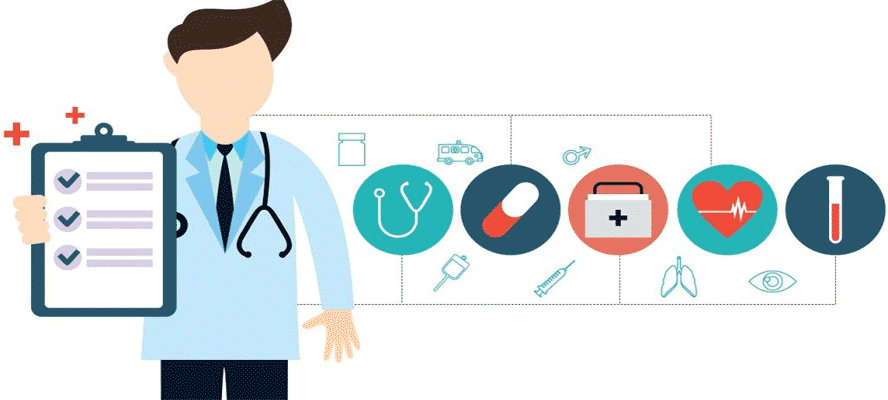“All your blood tests seem normal; continue what you’re doing.” Do you find this statement familiar? Doctors tell this to most patients who visit a primary care physician, despite their mental, physical, or emotional issues.
Unfortunately, our present healthcare system does not place a sufficient financial priority on disease prevention. For example, it does not pay doctors to talk to their patients about their health habits or request extensive labs that could detect underlying malfunction early enough to avert full-blown sickness.
Advanced medical testing and health can detect abnormalities before they become a problem. That’s why you should have completed a few crucial labs each year.
5 Essential Blood Tests to Frequently Do
Broad Thyroid test
Your doctor will check a couple of thyroid indicators in most primary care locations. Thyroid Stimulating Hormone (TSH) and total T4 (thyroxine) are usually the ones examined in thyroid tests. These provide a brief insight into the thyroid’s operation. In addition, FT3, Free Thyroxine Ft4, triiodothyronine (T3), Reverse T3, Anti Thyroglobulin Antibody Atg, and AMA are six more thyroid-related results frequently assessed for the patients.
Doctors search for “optimal ranges” of these labs rather than “average ranges” in a thyroid test. For example, the “normal range” for TSH is commonly considered 0.2–4.5; however, studies reveal that when TSH rises above 2.5, the body does not operate normally, and the rate of miscarriage doubles in the first trimester.
Essential Nutrients: vitamin B12, vitamin D, iron/ferritin, magnesium
Iron, Vitamin B 12, Vitamin D, and Magnesium are essential for normal bodily function but rarely tested at routine primary care visits. Unfortunately, many people lack these nutrients for various reasons, so it’s critical to monitor them and provide supplements when necessary. When people are deficient in these nutrients, supplementing can drastically change their lives. There’s an endless count of patients who have seen miraculous health improvement after starting these immune system. Therefore, it’s critical to focus on getting to the “ideal range” rather than the “regular range.”
The “normal range” for vitamin D is from 30-100 nmol/l, while the patient should ideally come in the “optimal range,” which is closer to 50-80 nmol/l. Most scientific researches found optimal levels for lower extremity function, bone mineral density (BMD), risk of falls, oral health, fractures, admission to a nursing home, incident hypertension, and cancer prevention are at least 75 nmol/l.
Complete Metabolic Panel and Complete Blood Count
These blood tests are crucial for determining a person’s electrolyte and hydration levels, kidneys and liver, and hemoglobin. These numbers can also inform if someone is fighting an infection, has anemia, or has clotting problems.
In terms of ideal ranges, we can tell if there is a detoxification or liver inflammation if liver enzyme levels are still regarded as “normal” but on the higher end. It would help if you handled it immediately to prevent further sickness progression. Several studies have demonstrated that its vital to minimize this upper lab limit to detect liver inflammation early, particularly in certain groups.
Metabolic Markers: Hemoglobin A1c, fasting glucose and insulin, lipid profile test
These Metabolic indicators are critical for determining how a person processes the macronutrients they consume. A baseline LDL cholesterol test and glucose level are done yearly in most primary care visits, and if you’re lucky, you’ll also get a Hemoglobin A1c. Getting the lipid profile test done using extended lipid panels instead of a basic one helps figure out whether the patient’s LDL-bad cholesterol are genuinely increasing their risk of heart or not.
The blood sugar is a relative marker of oxidation in the body and is a measurement of blood glucose levels averaged over the previous 90 days. Elevated blood glucose levels cause oxidation, or damage, to DNA, liver, and tissues in our bodies over time; therefore, knowing and optimizing this value is critical.
Elevations in any of these numbers indicate that your body is having trouble absorbing glucose, which can cause a risk of heart disease, diabetes, cancer, and Alzheimer’s disease. Even if your Hba1c is within the “normal range,” every 0.1 rise in its level increases your brain shrinkage rate.
Inflammatory markers: hsCRP, homocysteine
These inflammatory indicators never got tested during a typical primary care visit. High Sensitivity C Reactive Protein Hs Crp is an inflammatory marker that helps you understand the level of inflammation you’re dealing with, and even a minor increase in hS-CRP boosts your risk of experiencing cardiac events and Depression. In addition, physical trauma, oxidative and emotional stress, allergies, environmental toxicity, sedentary lifestyle, or food sensitivities can trigger an increase, indicating that you need to address the underlying inflammation within the body.
Homocysteine refers to an Amino acids that you must remove with the help of methylation vitamin B12 and folic acid. Elevations in this level can signal a variety of things, including stroke and heart disease risk, B vitamin status, methylation ability, detox and neurotransmitter production, and the ability to turn off cancer genes. Therefore, it’s a critical sign that we strive to improve by supplementing with methyl-B vitamins as necessary.
How often should you be checked?
Wondering about How Often You Must Have A Routine Body Checkup? It would be best to get routine blood testing done at least once a year. Several factors that may necessitate blood testing include:
- If you want to make a lifestyle shift. Abnormalities in several parameters like low-density lipoprotein (LDL-bad cholesterol) and high-density lipoprotein (LDL-bad cholesterol) can assist you in changing your diet or workout routine.
- If you’re having strange, persistent symptoms like lethargy, odd weight gain or loss, or new discomfort, it’s time to see a doctor.
- You have a higher risk of specific diseases due to your family history or lifestyle choices.
- Regular blood tests help identify the warning indications of most medical conditions. These indications can further aid in assessing or minimizing the risk of diseases or consequences.
What Cancers Are Detected By Blood Tests?
There are several types of cancers that can be detected through blood tests. Some examples include leukemia, lymphoma, and multiple myeloma. These types of blood cancers can be detected through tests that measure the levels of certain proteins and other substances in the blood.
Additionally, there are other types of cancers that can sometimes be detected through blood tests, such as ovarian and pancreatic cancer. It’s important to note, however, that not all cancers can be detected through blood tests, and that these tests are often used in conjunction with other diagnostic tools, such as imaging tests and biopsies.
What Can Blood Test Detect?
Blood tests can be used to detect a wide range of conditions and diseases. Some common things that can be detected through blood tests include infection, anemia, diabetes, and certain types of cancer. Blood tests can also be used to check levels of certain substances in the body, such as hormones, cholesterol, and enzymes.
Additionally, blood tests can be used to check how well certain organs, such as the liver and kidneys, are functioning. Blood tests are often an important part of a doctor’s diagnostic process, as they can provide valuable information about a person’s health.
What Should You Not Do Before A Blood Test?
There are a few things that you should avoid doing before a blood test in order to ensure that the results are accurate. First, you should avoid eating or drinking anything other than water for several hours before the test, as certain foods and beverages can interfere with the results.
For example, if you are having a glucose tolerance test to check for diabetes, you should avoid consuming anything other than water for at least 8 hours before the test. Additionally, you should avoid taking certain medications, such as blood thinners, before the test, as these can also affect the results. It’s always a good idea to talk to your doctor about any specific instructions or precautions to take before a blood test.
Why Is Blood Test Important?
Blood tests are important for a number of reasons. One of the main reasons is that they can provide valuable information about a person’s health and help diagnose certain conditions or diseases. For example, a blood test can be used to check for high levels of cholesterol, which can be a risk factor for heart disease. Blood tests can also be used to check for the presence of certain hormones or proteins, which can help diagnose conditions such as diabetes or anemia.
Additionally, blood tests can be used to check the function of certain organs, such as the liver and kidneys. Overall, blood tests can provide valuable information that can help doctors diagnose and treat a wide range of health conditions.
What Are The Three Main Blood Tests?
There are many different types of blood tests, and the specific tests that are done can vary depending on a person’s individual circumstances and health needs. However, some of the most common blood tests include:
- Complete blood count (CBC): CBC test measures the levels of different types of cells in the blood, such as red blood cells, white blood cells, and platelets. The CBC is often used to diagnose conditions such as anemia, infection, and leukemia.
- Basic metabolic panel (BMP): BMP Test measures the levels of certain substances in the blood, such as glucose (sugar), electrolytes, and blood urea nitrogen (BUN). The BMP is often used to diagnose conditions such as diabetes and kidney disease.
- Lipid panel: lipid profile test measures the levels of certain fats (lipids) in the blood, such as cholesterol and triglycerides. The lipid panel is often used to diagnose conditions such as high cholesterol and heart disease.
These are just a few examples of the many different types of blood tests that are available. It’s always a good idea to talk to your doctor about the specific tests that are recommended for you.
What Do Basic Blood Tests Show?
Basic blood tests, also known as a basic metabolic panel or a chemistry panel, are used to measure the levels of certain substances in the blood. These tests can provide important information about a person’s overall health and help diagnose certain conditions or diseases. Basic blood tests typically measure the levels of glucose (sugar), electrolytes, blood urea nitrogen (BUN), and creatinine.
These substances are involved in a wide range of bodily processes, and their levels can be affected by various conditions or diseases. For example, high levels of glucose can indicate diabetes, while high levels of creatinine can indicate kidney disease. Basic blood tests are often used as part of a routine health checkup to help diagnose potential health issues and monitor overall health.
Again, the specific blood tests that you should get will depend on your individual circumstances and health needs. It’s always a good idea to talk to your doctor about the tests that are recommended for you.
Conclusion
You can also get the online blood testing because of the advancements in the healthcare sector. However, blood tests aren’t the most important thing you can do for your health. The significance lies in your doctor’s interpretation and guidance and how that translates into actual adjustments in your life that will impact your health.









